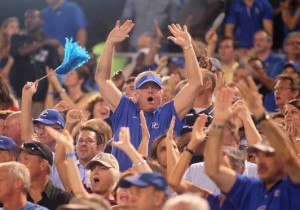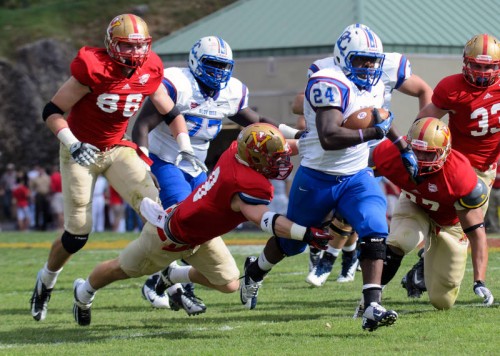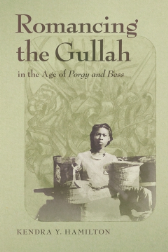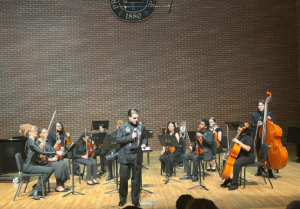The Advantage of Guaranteed Failure

November 17, 2012
With the 2012 football season coming to a close, we look back on PC’s performance and ask ourselves, “What the heck happened?!”

If you think that you’re the only one with these less-than-optimistic thoughts, worry not. Athletic director Brian Reese described the season as “difficult … and disappointing”. Apparently, quite a few integral players sustained extensive injuries at the beginning of the year causing the season to take a different turn than expected.
To add to this streak of poor fortune, some “key players” were asked not to return to PC this year because of certain behavioral issues on campus. Reese stressed the fact that, while missing important players is never ideal, such issues take precedence over the football season and are treated very seriously by the athletic department.
After tying for third in last year’s conference, this season has certainly been discouraging. When asked how we stack up statistically compared to last year, director Resse replied, “Awful!” In his eyes, the most difficult aspect of the situation is that our team lost all of the momentum they had built up last year. Game attendance had increased significantly, and they had “put everything in place for it to be a great year.” However, the misconduct that prevented several players from returning last year happened after the recruitment period was over, and by that point it was too late to fill their positions with players who would “fit”.
Regardless, Reese sums up the season best with, “You know, it’s not the season that we wanted it to be, but that’s going to happen sometimes.” He is amazed that, despite everything, “the players on the team are still working hard” and that “they come into work ready to hit hard and ready to go after it again and again” each week.
With our season off to a rocky start all on its own, you may be wondering why exactly we play such imposing teams as Georgia Tech and Vanderbilt. These are called guarantee games because there is always one team that is guaranteed to win. From a competitive standpoint, they are certainly unfavorable because of the negative impact on our record. Why, then, do we waste time playing a game we have little to no chance of winning? Because it brings in a great deal of money for our athletic department.
There are several questions flying around PC regarding the money that is received from playing these games and its intended purpose. Many students wonder where the money goes, why it’s not used to buy stadium lights, or why it only goes to the athletic department.
Each time we play one of these big schools, PC generally collects between $400,000-$500,000. Some of that money goes to paying for travel costs as most of these bigger schools are a great distance from PC. Some of it goes to offsetting budget costs. And the rest of it goes to some kind of project to be completed within the athletic department.
This year, because we played two guarantee games, PC raked in nearly $1,000,000. After covering the inconsequential travel costs, the athletic department used that money to revamp the athletes’ weight room. Much of the equipment was becoming unsafe due to age, so the department decided that replacing it all would create a better and safer environment that was more conducive to athletic growth.
After fixing up the weight room and using some of the money to offset this year’s budget costs, the athletic department invested the rest of their earnings in a program to benefit PC’s registrar: “One thing I’m very happy about is that we were able to give back to academics $100,000 to purchase the Degree Works program. It’s always been a priority of the school, but they could never figure out how to do it. Well, we played two games this year, and I said, ‘This is a time for athletics to give back to academics.’”
Reese made the point that giving back isn’t going to be able to happen all the time because there’s not always that opportunity, but since they were able to this year, they decided to try to help out. The Degree Works program is going to help make the registrar’s office much more efficient. Rather than someone having to go through each student’s records by hand, this program will automatically keep track of which courses have been taken and which courses each student still needs to graduate. It will be of huge benefit to students and faculty alike. Reaffirming his excitement, Reese joked that even if he gets fired, this program will continue to help PC and will always be associated with the two guarantee games that we played this year.
Another concern that is raised about these games is the fact that our athletes, while conditioned and trained just like any others, are playing students who are often bigger, stronger, and faster. Many are concerned with the injuries that seem imminent. Reese debunks these concerns, however: “When you play these big schools, you don’t get hurt. The other team’s technique is so much better, they’re off you quicker.” His statistics show that the number of injuries after these games are far fewer than after a conference game. While the other team’s skill allows them to score more points, it also helps them to keep our players safe.
On the scoreboard, these games are usually slanted heavily towards the other team. It’s not just that they beat us; there is generally a 60+ point discrepancy when it’s all said and done. Could this not be hurting the morale of the team? Again, Reese negates this claim: “All of our teams want to see how they stack up to these bigger schools. Student-athletes look forward to playing these games.” This year was especially hard because both of our guarantee games were played on consecutive weekends, and there wasn’t a great deal of student or alumni support at either one. It’s times like these that the athletes feel more physically downtrodden than emotionally distressed.
Guarantee games are scheduled each season without fail. They are necessary to maintain a working athletic department. While they may be seen as an overall negative addition to the year’s schedule, guarantee games are proven to be more beneficial to our student athletes than they are detrimental. The students look forward to playing larger and more legitimate teams, so these games tend to boost team morale rather than degrade it. So guarantee games provide a great deal for PC athletics with little to no cost? Doesn’t sound like such a bad deal after all.





